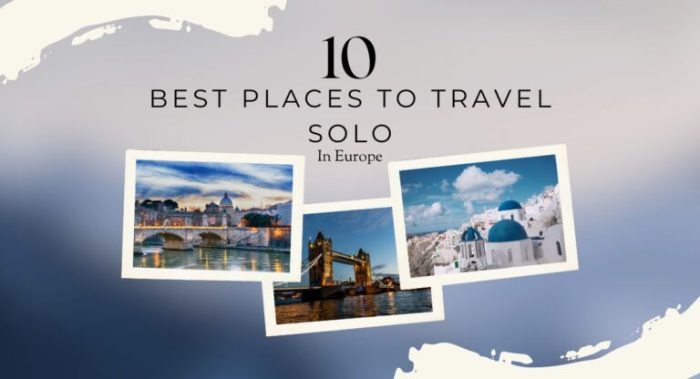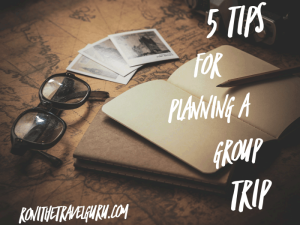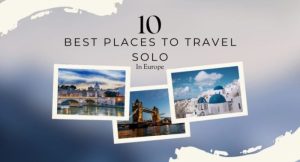
Embark on a solo journey through the enchanting lands of Europe with our comprehensive guide on Solo Travel in Europe. From cultural immersion to budget-friendly tips, get ready to discover the joys of traveling solo in this diverse continent.
Explore the rich tapestry of European cultures, indulge in local cuisines, uncover hidden historical gems, and embrace luxury experiences within your budget as you navigate through the wonders of Europe on your own.
Introduction to Solo Travel in Europe
Solo travel refers to the act of exploring the world independently, without the companionship of family or friends. It has gained significant popularity in recent years as more people seek unique experiences and personal growth opportunities. Solo travel allows individuals to step out of their comfort zones, challenge themselves, and immerse in different cultures.
The Growing Trend of Solo Travel in Europe
Europe has become a hotspot for solo travelers due to its diverse landscapes, rich history, and vibrant cities. The continent offers a mix of bustling metropolises, charming villages, and breathtaking natural wonders, making it an ideal destination for those looking to embark on a solo adventure.
The Benefits of Solo Travel for Personal Growth and Exploration
- Independence: Solo travel allows individuals to make decisions independently, boosting confidence and self-reliance.
- Cultural Immersion: Traveling alone provides a deeper connection to local cultures and traditions, offering a more authentic travel experience.
- Skill Development: From navigating new cities to problem-solving on the go, solo travel helps individuals enhance their adaptability and resourcefulness.
- Self-Discovery: Being alone in a foreign environment allows for introspection and self-discovery, leading to personal growth and a better understanding of oneself.
Cultural Tourism in Europe
Exploring the diverse cultures across European countries is a fascinating experience for solo travelers. Immersing oneself in the local culture can provide a deeper understanding of the destination and create memorable experiences.
Importance of Cultural Immersion
When traveling solo in Europe, cultural immersion is essential for truly experiencing the richness and diversity of each country. Engaging with local traditions, customs, and people can offer insights into the history and way of life of the place you are visiting.
- Attend cultural festivals and events to witness traditional performances, music, and art.
- Explore local markets to taste authentic cuisine and interact with locals.
- Visit museums, galleries, and historical sites to learn about the country’s heritage and artistic achievements.
- Participate in cooking classes, language lessons, or craft workshops to engage with the culture hands-on.
Eco-Tourism in Europe
When it comes to solo travel in Europe, eco-tourism is a growing trend that focuses on responsible travel practices and sustainable experiences. Solo travelers can make a positive impact on the environment by choosing eco-friendly options and adopting mindful behaviors during their adventures in Europe.
Eco-Friendly Travel Options
- Opt for accommodations that have green certifications or practice sustainability, such as eco-friendly hotels, hostels, or guesthouses.
- Explore destinations on foot, by bike, or using public transportation to reduce carbon emissions and support local communities.
- Participate in eco-tours or outdoor activities that promote environmental conservation and wildlife protection.
Sustainable Practices
- Reduce plastic waste by carrying a reusable water bottle, utensils, and shopping bags.
- Support local farmers and artisans by shopping at markets or stores that offer organic and locally sourced products.
- Respect nature and wildlife by following designated trails, avoiding littering, and refraining from disturbing animals in their habitats.
Tips for Reducing Environmental Impact
- Minimize energy consumption by turning off lights, air conditioning, and heating when not in use.
- Offset carbon emissions from flights by participating in carbon offset programs or supporting reforestation projects.
- Engage with local communities and learn about their sustainability initiatives to promote responsible tourism practices.
Culinary Travel in Europe
When it comes to solo travel in Europe, exploring the rich culinary heritage of different countries can be a delightful experience. From traditional dishes to local specialties, European cuisine offers a wide array of flavors for solo travelers to indulge in.
Unique Food Experiences
One of the unique food experiences for solo travelers in Europe is dining at local markets. Many cities in Europe have vibrant markets where you can sample fresh produce, local cheeses, cured meats, and other delicacies. This immersive food experience allows solo travelers to interact with locals and discover the true essence of the region’s culinary traditions.
Recommendations for Solo Travelers
- Try street food: Street food vendors in Europe offer a variety of delicious snacks and meals that are perfect for solo travelers on the go. From crepes in Paris to currywurst in Berlin, exploring street food can provide a taste of authentic local flavors.
- Take a cooking class: Participating in a cooking class is a great way for solo travelers to learn about the local cuisine and immerse themselves in the culinary culture of a destination. Whether it’s making pasta in Italy or mastering the art of paella in Spain, cooking classes offer a hands-on experience that can be both educational and fun.
- Visit food festivals: Europe is home to a plethora of food festivals throughout the year, celebrating everything from wine and cheese to seafood and chocolate. Attending a food festival can give solo travelers the opportunity to taste a wide range of regional specialties and mingle with food enthusiasts from around the world.
Historical Travel in Europe

Exploring the historical landmarks and sites in Europe is a fascinating journey that allows solo travelers to immerse themselves in centuries of rich history. The significance of these historical sites in shaping European culture cannot be understated, as they offer a glimpse into the past and provide a deeper understanding of the present. Here are some tips on safely and independently exploring historical sites in Europe.
Must-Visit Historical Landmarks
- Visit the iconic Colosseum in Rome, Italy, and imagine the gladiator battles that once took place within its walls.
- Explore the majestic Acropolis in Athens, Greece, and marvel at the ancient ruins of the Parthenon.
- Discover the historic Tower of London in England, home to the Crown Jewels and centuries of royal history.
Significance of History in European Culture
European culture is deeply rooted in its history, with each country boasting a unique heritage that has been shaped by centuries of events, rulers, and traditions. By exploring historical sites, solo travelers can gain a deeper appreciation for the cultural richness and diversity that defines Europe.
Tips for Exploring Historical Sites Safely
- Research the historical site in advance to understand its significance and any safety guidelines.
- Be mindful of your surroundings and respect any rules or regulations in place to protect the site.
- Consider joining a guided tour to learn more about the history and context of the site from knowledgeable experts.
- Carry a map, water, and snacks to ensure you are prepared for your exploration of historical landmarks.
Luxury Travel in Europe
Traveling solo in Europe doesn’t have to mean sacrificing luxury. There are plenty of options for solo travelers seeking upscale experiences that cater to their desire for comfort and elegance.
When it comes to luxury travel in Europe, solo travelers can indulge in high-end accommodations, fine dining experiences, and exclusive activities that offer a glimpse into the lavish lifestyle.
Upscale Accommodations
- Stay in luxurious boutique hotels or elegant five-star resorts in popular European cities like Paris, London, or Rome.
- Consider renting a private villa or upscale apartment for a more personalized and exclusive stay.
- Experience the opulence of historic castles or palaces that have been transformed into luxury hotels.
Fine Dining Experiences
- Indulge in gourmet cuisine at Michelin-starred restaurants and trendy eateries known for their innovative menus.
- Join a culinary tour or cooking class to learn about local ingredients and traditional dishes from top chefs.
- Enjoy wine tastings at prestigious vineyards or champagne houses for a truly decadent experience.
Exclusive Activities
- Embark on private guided tours of iconic landmarks and hidden gems with knowledgeable local guides.
- Participate in VIP cultural events, such as opera performances, art exhibitions, or fashion shows.
- Indulge in spa treatments, wellness retreats, or luxury shopping excursions for a relaxing and rejuvenating experience.
Budget Travel in Europe
Traveling to Europe on a budget is definitely possible, even for solo travelers. By being strategic with your choices, you can explore this beautiful continent without breaking the bank.
Tips for Budget Travelers
- Consider traveling during the shoulder season or off-peak times to find cheaper flights and accommodations.
- Opt for budget airlines or trains for intercity travel to save on transportation costs.
- Look for hostels, guesthouses, or Airbnb options instead of hotels for more affordable accommodation.
- Take advantage of free walking tours in major cities to get a feel for the place without spending extra money on guided tours.
- Explore local markets and street food for budget-friendly dining experiences.
Cost-Saving Strategies
- Consider purchasing city passes or museum cards for discounted entry to multiple attractions.
- Use public transportation or walk instead of taking taxis to save money on getting around.
- Book activities and tours in advance to secure lower prices and avoid last-minute expenses.
Budget-Friendly Destinations
- Eastern Europe: Countries like Hungary, Poland, and Czech Republic offer affordable options for accommodations, dining, and sightseeing.
- Portugal: Explore the stunning coastlines, historic cities, and delicious cuisine without breaking the bank.
- Balkan Peninsula: Countries like Croatia, Montenegro, and Albania provide budget travelers with beautiful landscapes and cultural experiences at a lower cost.
Backpacking in Europe
Backpacking in Europe is a popular choice for solo travelers due to its rich cultural diversity, historic landmarks, and easy access to different countries within a short distance. The backpacking culture in Europe offers a unique opportunity to immerse oneself in various cultures, meet like-minded travelers, and explore off-the-beaten-path destinations.
Backpacking Essentials
- Backpack: Invest in a durable, comfortable backpack that fits your body well and has enough room for all your essentials.
- Clothing: Pack versatile clothing suitable for different weather conditions and cultural norms.
- Travel Documents: Keep your passport, travel insurance, and any necessary visas in a secure and easily accessible location.
- Money: Carry a mix of cash and cards, and be aware of currency exchange rates in the countries you will visit.
- Travel Gear: Items like a sturdy water bottle, travel towel, universal adapter, and portable charger can come in handy during your trip.
Safety Tips for Solo Backpackers
- Stay Alert: Be aware of your surroundings and trust your instincts if something feels off.
- Share Itinerary: Inform someone you trust about your travel plans and check in regularly.
- Emergency Contacts: Keep a list of emergency contacts, including local authorities and your country’s embassy.
- Health Precautions: Research healthcare facilities in the areas you will visit and carry necessary medication.
- Cultural Sensitivity: Respect local customs and traditions to avoid any misunderstandings or conflicts.
Solo Travel Tips for Europe
Traveling solo in Europe can be an incredibly rewarding experience, allowing you the freedom to explore at your own pace and immerse yourself in different cultures. However, it’s important to take certain precautions and be mindful of cultural differences to ensure a safe and enjoyable trip.
Safety Precautions
- Always keep your belongings secure and be aware of your surroundings, especially in crowded tourist areas.
- Research the areas you plan to visit and avoid walking alone at night in unfamiliar or poorly lit areas.
- Stay connected with friends or family back home and share your itinerary with them for added safety.
Cultural Etiquette
- Learn a few basic phrases in the local language to show respect to the locals.
- Be mindful of local customs and traditions, such as dress codes or greetings, to avoid unintentionally offending anyone.
- Respect cultural differences and be open-minded when interacting with people from different backgrounds.
Connecting with Locals and Other Travelers
- Stay in hostels or join guided tours to meet fellow travelers and potentially make new friends along the way.
- Use social media or travel apps to connect with locals for recommendations on hidden gems or off-the-beaten-path attractions.
- Attend local events or workshops to immerse yourself in the culture and meet like-minded individuals who share your interests.
Group Travel in Europe

When it comes to exploring Europe, travelers often have the choice between embarking on solo adventures or joining group tours. Each option provides a unique experience, with its own set of advantages and drawbacks. Let’s delve into the world of group travel in Europe and see how it compares to solo travel.
Comparing Solo Travel vs. Group Travel
- Solo Travel:
- Freedom to create your own itinerary and explore at your own pace.
- Opportunity for self-discovery and personal growth.
- Greater flexibility in choosing activities and destinations.
- Group Travel:
- Enhanced social interaction and the chance to meet like-minded travelers.
- Access to group discounts and exclusive experiences.
- Expert guidance and knowledge from tour guides.
Benefits of Group Travel for Social Interaction and Shared Experiences
Group travel in Europe offers a sense of camaraderie and shared experiences that may enrich your journey. By joining a group tour, you can connect with fellow travelers, exchange stories, and create lasting memories together. This social aspect of group travel can enhance your overall experience and provide a sense of belonging during your trip.
Insights on Joining Group Tours or Activities as a Solo Traveler in Europe
If you are a solo traveler looking to join group tours or activities in Europe, there are plenty of options available. Many tour companies cater to solo travelers and offer group tours specifically designed for individuals exploring Europe on their own. By joining these tours, you can enjoy the benefits of group travel while still maintaining the freedom and independence of solo exploration.
Whether you’re interested in cultural excursions, outdoor adventures, or culinary experiences, there is a group tour out there waiting for you to join and embark on a memorable journey through Europe.
Conclusive Thoughts
As you conclude your virtual European adventure, remember that the essence of solo travel lies in the freedom to explore at your own pace, connect with locals, and create unforgettable memories. So pack your bags, set out on your solo escapade, and let Europe mesmerize you every step of the way.
FAQ Summary
Is solo travel safe in Europe?
Solo travel in Europe is generally safe, but it’s essential to take basic precautions like staying alert, avoiding isolated areas at night, and keeping your belongings secure.
How can I meet other travelers while traveling solo in Europe?
You can meet other travelers by staying in hostels, joining group tours or activities, attending local events, or using social media platforms specifically for travelers.
What are some budget-friendly destinations in Europe for solo travelers?
Popular budget-friendly destinations in Europe for solo travelers include Prague, Budapest, Lisbon, and Krakow, offering a mix of affordability and rich cultural experiences.





